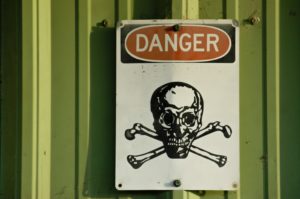Table Of Contents:
- Introduction: What is Domestic Violence?
- Signs of an Abusive Relationship
- Physical and Sexual Abuse
- Emotional Abuse
- Abusive Behavior is a Choice
- The Cycle of Violence in Domestic Abuse
- Recognizing the Warning Signs of Abuse
- Conclusion: Speak up if you Suspect Domestic Violence or Abuse
What Is Domestic Violence and Abuse?
 What is domestic violence and abuse? Domestic abuse is also referred to as relationship abuse or intimate partner violence (IPV). It is defined as an incident or pattern of behaviors perpetrated by one partner to maintain control and power over another in an intimate relationship. The events can be coercive, degrading, threatening, and violent. They could also include acts of sexual violence. Contact a New Jersey Criminal Defense Lawyer if you fear you are in an abusive relationship.
What is domestic violence and abuse? Domestic abuse is also referred to as relationship abuse or intimate partner violence (IPV). It is defined as an incident or pattern of behaviors perpetrated by one partner to maintain control and power over another in an intimate relationship. The events can be coercive, degrading, threatening, and violent. They could also include acts of sexual violence. Contact a New Jersey Criminal Defense Lawyer if you fear you are in an abusive relationship.
Behaviors that constitute domestic violence can cause physical harm or fear. They can include, but are not limited to, the following:
- Coercive control: threats, intimidation, isolation, or degradation
- Emotional or psychological abuse
- Physical violence
- Sexual abuse: indecent assault, rape, or other unwanted sexual behaviors
- Economic or financial deprivation
- Stalking
- Harassment
- Online or digital abuse
- Social abuse
- Spiritual abuse: Attacks on religion, culture, or beliefs
Physical and sexual abuse or threats are the most common and apparent forms of domestic violence. Nonetheless, several types of domestic abuse can occur at the same time within the same relationship. For instance, a partner can exert emotional abuse and reinforce it with physical violence from time to time.
How Often Does Domestic Violence Happen?
 In essence, incidences of domestic violence can occur regularly, occasionally, or at random intervals. When they are not happening, they could place the victim in constant fear of future abuse. This could allow the perpetrator to have a stronghold on the life of their victim.
In essence, incidences of domestic violence can occur regularly, occasionally, or at random intervals. When they are not happening, they could place the victim in constant fear of future abuse. This could allow the perpetrator to have a stronghold on the life of their victim.
The majority of domestic abuse cases involve a partner or ex-partner. Victims could be married to their abuser, dating them, or just living with them. However, incidents can also be caused by a caregiver or family member. They can also be perpetrated by and against adults and adolescents alike.
Additionally, incidences of domestic violence are not discriminative. Victims could be of any gender, age, race, religion, or sexual orientation. They could also be of hold any education level or hail from any socioeconomic background.
Factors that Increase Risk of Domestic Violence
 That said, certain risk factors may increase the chances of someone falling victim to intimate partner abuse. These include lack of high school education, low self-esteem, poverty, attitudes of male domination, substance or alcohol abuse, and witnessing family violence as a child.
That said, certain risk factors may increase the chances of someone falling victim to intimate partner abuse. These include lack of high school education, low self-esteem, poverty, attitudes of male domination, substance or alcohol abuse, and witnessing family violence as a child.
Relationship abuse is a significant public health problem. In the United States, it affects more than 800,000 men and 2 million women. It often leads to injury, homelessness, and sometimes the death of the victims. It is also a major cause of accumulated medical costs and loss of work productivity.
Despite this, domestic abuse continues to be endorsed in society today through a lack of legal protections for LGBT victims and the legal sanctioning of women’s subjugation.
Additionally, healthcare providers only screen for domestic abuse in only 2 out of every 10 patients they see. This increases the chances of incidences of violence going unnoticed.
Effects of Domestic Violence
 When left untreated, domestic violence prognosis can have debilitating physical and emotional consequences. It could also end in victim suicide or homicide. This can be mitigated by establishing and maintaining the safety of the victims.
When left untreated, domestic violence prognosis can have debilitating physical and emotional consequences. It could also end in victim suicide or homicide. This can be mitigated by establishing and maintaining the safety of the victims.
While intimate partner violence may seem obvious to identify, some victims may not be aware that they are in an abusive relationship. Their relatives or loved ones may also be blind to any signs that point to the same.
How, therefore, can one recognize domestic abuse or violence? Call an NJ Domestic Violence Attorney today for help.
Signs of an Abusive Relationship
 It is not always evident that you are in an abusive relationship. This is why it is crucial to learn the warning signs that could alert you to an abusive partner. According to experts, a constant feeling of fear should be a red flag. You should also be careful not to convince yourself that you are to blame. No one deserves to be abused by those closest to them.
It is not always evident that you are in an abusive relationship. This is why it is crucial to learn the warning signs that could alert you to an abusive partner. According to experts, a constant feeling of fear should be a red flag. You should also be careful not to convince yourself that you are to blame. No one deserves to be abused by those closest to them.
If any of these signs of an abusive relationship resonate with your situation, contact a New Jersey Criminal Defense Lawyer immediately for legal assistance.
Indications of an Abusive Relationship
Domestic violence and abuse are present in more ways than physical violence. It could be meted out as sexual, physiological, or emotional abuse. Regardless of the abuse, you are victim to, here are some signs to look out for:
Emotional Put-Downs
Psychological intimidation by your partner can include being:
- Ridiculed privately and publicly through attacking your physical appearance, mental health, intelligence, or capabilities
- Blamed for all the problems in the relationship and the outbursts that follow them
- Compared unfavorably to other people
- Told that no one else would want to be in a relationship with you.
Possessiveness
 This is shown through your partner checking on you all the time. They may always want to know where you are, who you are with, and what you are doing. They may also try to control aspects of your social life and get angry when you go against their wishes.
This is shown through your partner checking on you all the time. They may always want to know where you are, who you are with, and what you are doing. They may also try to control aspects of your social life and get angry when you go against their wishes.
Jealousy
Your partner may continuously accuse you of flirting with other people or accuse you of being unfaithful. As a response to this, they may isolate you from friends and family or treat them rudely when they are around.
Threats of Violence
This includes yelling and threats of use of violence against you, your friends, family, or pets. It could also involve your partner destroying your property or things you value.
Sexual and Physical Violence
You could be shoved, pushed, hit, or grabbed regularly or on occasion. You could also be forced to perform sexual acts you don’t want to and get threatened with physical violence should you refuse.
Consider Your Feelings
 The best signs of an abusive relationship are reflected in your feelings. How you feel about your partner or relationship should be a major tell. Victims of domestic abuse and violence often feel:
The best signs of an abusive relationship are reflected in your feelings. How you feel about your partner or relationship should be a major tell. Victims of domestic abuse and violence often feel:
- Things Will Get Better
Chances are, your abusive partner will apologize after an abusive episode. They may promise to change and give excuses for their behavior. If you continually think that things will change even when they don’t, you are in an abusive relationship.
- The Abuse Is Your Fault
Domestic abuse can be confusing to the victim. It can leave you afraid of what might happen to you if you leave your partner. As a result, you may begin to think that you deserve to be abused and try to ‘amend your ways.’
- Your Partner Loves You
Abusive partners are not violent throughout the relationship. In between episodes, they may be nice to you and seem considerate of your feelings. They could also go out of their way to convince you to see them in a good light.
Do you experience such conflicting emotions after a violent or abusive episode? Seek immediate help from an expert NJ Domestic Violence Attorney.
Physical and Sexual Abuse
Most times, the type of abuse used against a victim of domestic violence will overlap. Nonetheless, the most apparent forms of relationship abuse are physical and sexual abuse.
Physical Abuse
 Physical abuse involves the use of physical force in a way that could endanger or injure someone. The injuries could range in severity from a bruise to a fractured or broken bone.
Physical abuse involves the use of physical force in a way that could endanger or injure someone. The injuries could range in severity from a bruise to a fractured or broken bone.
Most incidences of domestic violence don’t begin as physical abuse. Most perpetrators use physical contact as a response to feelings of being challenged or presumed weak. Does your partner physically harm or abuse you? Speak to a professional New Jersey Criminal Defense Lawyer today for legal help.
Although any harmful physical contact can be considered abuse, typical examples of physical abuse include:
- Hair pulling
- Punching, strangling or kicking
- Scratching or biting
- Throwing objects at the victim such as a bottle, plate, phone, or shoe
- Grabbing a victim’s clothing
- Pushing or pulling
- Using a weapon such as a bat, gun, box cutter, mace, or knife
- Smacking a victim on the bottom without their consent or permission
- Grabbing a victim with an intent to restrain them or stop them from leaving
- Grabbing a victim’s face to force them to look at you
Prolonged exposure to physical abuse can eventually lead to disability, chronic illness, or even death. It could also affect your mental and emotional wellbeing. Fortunately, the law protects victims from any form of physical abuse. Not sure where to start? Call an NJ Domestic Violence Attorney today.
Sexual Abuse
 Sexual abuse encompasses all situations where a person is forced to participate in unsafe, unwanted, or degrading sexual activity. It also refers to any behavior that influences or impacts someone’s ability to control sexual activity or the circumstances in which the actions occur. This could include rape and restricting access to condoms and birth control.
Sexual abuse encompasses all situations where a person is forced to participate in unsafe, unwanted, or degrading sexual activity. It also refers to any behavior that influences or impacts someone’s ability to control sexual activity or the circumstances in which the actions occur. This could include rape and restricting access to condoms and birth control.
In essence, if you don’t want to engage in sexual activity but are coerced to, it is considered abuse. That said, it is crucial to note that a victim’s lack of resistance does not constitute consent. Sometimes, victims prefer not to struggle to reduce their chances of getting hurt.
Whether you were intoxicated, afraid, pressured, or too intimidated to voice your descent, you are still a victim. Sexual abuse is never the victim’s fault.
Some examples of sexual abuse include:
- Rape or attempted rape
- Having sexual contact with a person who is intoxicated, drugged, unconscious, or unable to give a clear and informed “yes” or “no.”
- Restricting someone’s access to birth control or refusing to use condoms
- Unwanted touching or kissing
- Unwanted violent or rough sexual activity.’
- Preventing someone from protecting themselves against STIs
- Threatening a victim to perform sexual acts or have sex
- Forcing or pressuring someone into unwanted sexual activity
- Using sexual insults on someone
Keep in mind that most perpetrators of sexual abuse are known to their victims. They can include family members, friends, or even a partner with whom the victim has consensual sex. Also, both abusers and victims can be people of any race, religion, gender, age, or sexual orientation.
Are you a victim of physical and sexual abuse? Make sure you remove yourself from your attacker immediately and call for help once you are safe. You can also speak to an NJ Domestic Violence Attorney about your legal options and how to pursue them.
Emotional Abuse
 Not all perpetrators of domestic violence resort to physical or sexual abuse. Sometimes, abusers can adopt a consistent pattern of bullying or abusive behaviors that undermine a person’s self-esteem and mental health. When this happens, it is referred to as emotional abuse.
Not all perpetrators of domestic violence resort to physical or sexual abuse. Sometimes, abusers can adopt a consistent pattern of bullying or abusive behaviors that undermine a person’s self-esteem and mental health. When this happens, it is referred to as emotional abuse.
Emotional abuse is one of the most elusive forms of relationship abuse. Because the effects are not apparent, they can often go unnoticed. That said, this form of abuse is also the most diverse. It can range from subtle statements to overt and manipulative actions.
Emotional domestic violence can be perpetrated by family, friends, partners, spouses, or even employers and coworkers. As such, most victims may not be aware that they are being abused.
The effects of this type of abuse can be more crippling than physical abuse as they chip away at your personality. They challenge your thoughts, beliefs, and perceptions of yourself.
Please talk to a New Jersey Criminal Defense Lawyer about your emotionally abusive partner for legal advice.
How Can You Identify Emotional Abuse?
Although emotional abuse may not always be apparent to other people, you can evaluate your feelings to determine if you are in an emotionally abusive relationship.
It is emotional abuse if the words or behaviors are:
Accusatory, trivial, and unreasonable
 Does your partner, friend, or close relation:
Does your partner, friend, or close relation:
- Get extremely sensitive and angry when you make fun of them or make any comment they consider disrespectful?
- Fail to laugh at themselves when they do something silly?
- Accuse you of false things only contrived in their minds?
- Have trouble apologizing when they are wrong?
- Make excuses for their actions and blame anyone but themselves, including circumstances, other people, or yourself?
- Disregard your boundaries or valid requests?
- Label you or call you names?
- Blame you for everything wrong in your relationship?
Humiliating, discounting, degrading, judging, negating, or criticizing
- Does your partner, friend, or family relation:
- Call you ‘too sensitive’ when you complain?
- Use sarcasm to degrade you or put you down?
- Tease or make fun of you in public and private?
- Tell you your feelings or opinions are wrong?
- Regularly disregard, ridicule, and dismiss your beliefs, opinions, suggestions, thoughts, and feelings?
Controlling, embarrassing, and dominating
Are you constantly:
- Chastised or corrected because of behavior they consider ‘inappropriate’?
- Treated like you are a child?
- Treated as inferior to your abuser?
- Made to believe that you are always wrong, and they are always right?
- Reminded of your shortcomings?
- Required to seek permission for every small decision, including before going somewhere?
- Given dismissive, disapproving, condescending, or contemptuous looks for your behavior or comments?
- Belittled on the basis of your beliefs, aspirations, accomplishments, or plans?
Aimed at isolation, emotional distancing, neglect, or abandonment
Do you notice your abuser:
- Punishing you by failing to meet your basic needs or using abandonment and neglect?
- Withdrawing, withholding affection and attention, or pouting for no reason?
- Playing the victim when they are wrong?
- Pretending not to notice your feelings?
- Failing to show empathy when you are in distress?
Aimed at promoting enmeshment and codependence
Does anyone:
- Fail to respect your boundaries or protect the information you have not allowed them to disclose?
- Do what they think is best for you and disregard your requests?
- Treat you as an extension of themselves rather than as an individual?
Remember, not everyone will notice that you are in an emotionally abusive relationship. Make sure you talk to someone you trust as well as an expert NJ Domestic Violence Attorney.
Abusive Behavior Is a Choice
 Contrary to popular belief, abusive behavior is a choice. An NJ Domestic Violence Attorney will help you if you think you are a part of abusive behavior. It is not caused by an abuser’s lack of control or troubled childhood and should never be excused. In fact, most abusers adopt a violent approach to other people to satisfy certain feelings and beliefs. These include a:
Contrary to popular belief, abusive behavior is a choice. An NJ Domestic Violence Attorney will help you if you think you are a part of abusive behavior. It is not caused by an abuser’s lack of control or troubled childhood and should never be excused. In fact, most abusers adopt a violent approach to other people to satisfy certain feelings and beliefs. These include a:
- sense of entitlement
- belief they can get away with their abusive actions
- need to control someone
- belief that they have control over them
- experience with violence getting them what they want in the past
- the belief that their life takes priority over others
These attitudes and values are often shaped by social forces. Generally, this means that an abuser grew up or lives in an environment that either encourages violent or abusive behavior, rewards it or fails to punish it. Some of these forces include:
- Family – Teachings that specific family members can and should make all the decisions in a household
- Gender-role identity – Masculine or feminine ideologies that endorse violence, dominance, and aggression
- Media – Glorification of non-consensual sex and violence. Or portrayals of people as objects
- Social peer pressure – Being encouraged to exert dominance of a partner, friend, or relative
- Sports – Praise for aggression, competition, and dominance. That’s the sexist behavior that goes unpunished among teammates.
- Impunity – Ability to get away with domestic violence through excuses such as stress, intoxication, or being provoked by the victim.
That said, relationship abuse is voluntary and is not caused by any of the following factors:
- Problems in the relationship
- Provocation by the victim
- Stress
- Substance or alcohol abuse
- Genetic factors
- Anger or loss of control
- Culture
- Communication problems
- Illness or mental health problems
- Poverty
Domestic abuse is a tool used to manipulate and control victims. It often masquerades as a variety of actions that may be subtle enough to be ignored or even be considered acts of concern. Nonetheless, the tactics used by abusers are all aimed at achieving the same results. These include:
Humiliation
 To maintain the grip they have on your life, an abuser will try to make you feel bad about yourself at every turn. They can achieve this through name-calling, insults, body shaming, and public put-downs. These actions can leave you feeling powerless and significantly lower your sense of self-worth.
To maintain the grip they have on your life, an abuser will try to make you feel bad about yourself at every turn. They can achieve this through name-calling, insults, body shaming, and public put-downs. These actions can leave you feeling powerless and significantly lower your sense of self-worth.
Domination
Abusers try to seize control of every aspect of their victim’s life. They want to dictate what you eat when you leave the house, who you talk to, and what you do. Rather than treat you as an equal, they will interact with you as if you were their child, servant, or possession.
Isolation
Domestic violence perpetrators will try to increase your dependence on them. They will keep you from interacting with the outside world and cut off your connections with friends and family. They may even prevent you from going to work or school.
Submission
Most times, abusive people prefer pliable and submissive victims so they can exert control over them. To achieve this, they may give you threatening looks, destroy your property, put weapons in your line of sight, hurt your pets, or smash things in front of you.
Fear
An abuser will work to instill fear in you. They can threaten to harm you, your pets, or your loved ones should you try to report them or leave. They may also threaten to report you or commit suicide.
Abusive behavior is a choice because perpetrators have full control of their actions. Contact a New Jersey Criminal Defense Lawyer to learn what you can do about an abusive partner.
The Cycle of Violence in Domestic Abuse
 We have already established that abusive behavior is a choice. So, how exactly does it happen? The cycle of violence in domestic abuse is also called the Power and Control Wheel. It defines how abusive patterns emerge and develop in a relationship and spans subtle behavior to physical violence.
We have already established that abusive behavior is a choice. So, how exactly does it happen? The cycle of violence in domestic abuse is also called the Power and Control Wheel. It defines how abusive patterns emerge and develop in a relationship and spans subtle behavior to physical violence.
According to the Wheel, this cycle can happen countless times in an abusive relationship with each stage lasting a different amount of time. That said, not every domestic violence relationship will fit the cycle. You should consult a New Jersey Criminal Defense Lawyer nonetheless.
Many victims and survivors of domestic violence describe the cycle of abuse as occurring in four stages. These are:
Tension Building Phase
 During this stage, victims tend to feel like they are walking on eggshells around their abuser. This may last anywhere from a few hours to several months, with the victim getting more anxious as time progresses. In most cases, victims are never aware when they will draw the last straw.
During this stage, victims tend to feel like they are walking on eggshells around their abuser. This may last anywhere from a few hours to several months, with the victim getting more anxious as time progresses. In most cases, victims are never aware when they will draw the last straw.
During tension building:
- There is a breakdown of communication in the relationship.
- The abuser begins to get angry.
- The victim may try to keep the abuser calm.
- The victim will be anxious all the time.
Abusive Incident Phase
The abusive incident stage is also known as an explosion. It occurs when the tension finally breaks and can play out in different ways. The abuser may exert out verbal, physical, sexual, or emotional abuse on the victim. They may rape, hit, or try to assault the victim.
If the abuse in a relationship is primarily psychological, the abuser may deny the victim access to basic needs, threaten them, insult them, or humiliate them.
Reconciliation Phase
 After the high of the explosion stage, the abuser may start to feel remorse for their actions. They may try to initiate a reconciliation by buying gifts, suggesting a vacation, or taking the victim out on a date. They may also try to convince the victim that the abuse was their fault and that they asked for it.
After the high of the explosion stage, the abuser may start to feel remorse for their actions. They may try to initiate a reconciliation by buying gifts, suggesting a vacation, or taking the victim out on a date. They may also try to convince the victim that the abuse was their fault and that they asked for it.
At this point, the abuser could easily lapse into an explosion, depending on the response of the victim. The victim is often confused, scared, and humiliated throughout this phase.
Honeymoon phase
Depending on the victim’s response, the abuser will be extra affectionate to the victim. This is them trying to make up for their abuse. Many perpetrators will promise to change during this stage and assure the victim that the abuse will never happen again.
Although their efforts may seem genuine, they aim to lure the victim into a false sense of security. This is so they can decide to stay in the relationship. However, immediately after this phase is over, the tension will begin to build for the next incident.
During the honeymoon stage, the abuser may:
- Apologies for their actions
- Blame the victim for the abuse
- Promise it will never happen again
- Deny or downplay the abuse
- Act like it never happened
- Give gifts to the victim.
- Meet promises they made in the past
The cycle of violence in domestic abuse will not always have a honeymoon phase. In some cases, the explosion may be immediately followed by tension building.
The best time to talk to an NJ Domestic Violence Attorney is during the honeymoon stage before the tension begins to build.
Recognizing the Warning Signs of Domestic Abuse
 Some signs of domestic violence can be apparent and easy to identify. These include bruises, black eyes, or broken bones. Others, such as missed appointments, however, can easily be overlooked. This does not mean that their effects are any less debilitating or crippling. As such, recognizing the warning signs of abuse can be the difference between life and death.
Some signs of domestic violence can be apparent and easy to identify. These include bruises, black eyes, or broken bones. Others, such as missed appointments, however, can easily be overlooked. This does not mean that their effects are any less debilitating or crippling. As such, recognizing the warning signs of abuse can be the difference between life and death.
Domestic violence affects people in different ways. Nonetheless, the impacts are often both psychological and physical. Although these signs may not always point to abuse, it is vital to be aware of them.
If you suspect that a friend, loved one, or co-worker is being abused, consult a New Jersey Criminal Defense Lawyer for legal advice. Remember, many victims will try to cover up abuse. Nonetheless, it goes without saying that they would greatly benefit from your help.
Physical Signs of Domestic Abuse
Physical abuse may involve being hit, choked, punched, or knocked down. It often results in bodily injuries for which the victim will give weak or inconsistent explanations.
Some signs that can alert you to physical abuse include:
- Arm or face bruises
- Black eyes
- Broken or swollen lips
- Sprained wrists or ankles
- Purple or red marks on the neck
Victims will try to cover up any physical signs. You should also look out for when someone wears scarves and long sleeves on a hot day, excessive makeup, or sunglasses inside.
Emotional Signs of Domestic Abuse
Emotional abuse can take a severe toll on victims. They could begin to feel hopeless, afraid, and helpless. This will often show in how they behave or carry themselves when outside with friends and family. Some emotional signs of abuse include:
- Changes in sleeping habits
- Alcohol or substance abuse
- Constant anxiety, agitation, or apprehension
- Being extremely meek and apologetic
- Talking about attempting suicide
- Loss of interest in daily activities
Other problems may also cause some of these symptoms, but they could also signify domestic violence.
Behavioral Changes
Domestic abuse can change the way a person behaves. A once cheerful and outgoing person could all of a sudden turn into a recluse. Behavioral changes that signal domestic violence include a person:
- Isolating themselves and cutting contact with family and friends
- Becoming distant and reserved
- Canceling appointments or meetings at the last minute
- Being often late to work or activities
- Passing on activities they usually enjoy
- Displaying excessive privacy on their personal life and relationship.
Controlling Behavior from a Partner
As already mentioned, perpetrators of domestic abuse like to exercise control over their victims. Consequently, victims tend to seem like every aspect of their day is being manipulated by someone else. Signs to alert you to this can include a person:
- Getting constant calls or texts from someone concerning where they are, who they are with, and what they are doing
- Having very little money, not having a credit card, or having to account for everything they spend
- Asking permission to socialize with other people or go out
- Not having access to a vehicle
An abusive partner may also accompany their partner to every event or appointment.
Recognizing the warning signs of domestic abuse is only the first step towards helping a victim. The next step should be to take action. You can start by convincing them to speak to a professional NJ Domestic Violence Attorney about their problem.
Speak up if You Suspect Domestic Violence or Abuse
 Doing the right thing after recognizing the warning signs of abuse could save a person’s life. Do you know or suspect that someone you know is a victim of domestic violence? Don’t let the fear of doing or saying the wrong thing stop you from speaking up.
Doing the right thing after recognizing the warning signs of abuse could save a person’s life. Do you know or suspect that someone you know is a victim of domestic violence? Don’t let the fear of doing or saying the wrong thing stop you from speaking up.
Most victims of abuse feel lonely, isolated, and scared. By reaching out to them, you could give them the courage they need to get out of a bad situation finally.
If you or someone you love is a victim of domestic violence, contact a professional New Jersey Criminal Defense Lawyer immediately.
How Can You Help a Domestic Violence Victim?
Whatever you do to help a victim, you should remain sensitive to their situation. Here are some ways you can speak up against domestic abuse:
Make Time
A conversation about domestic abuse is set to be a long one. Make time for the victim and be ready to clear your schedule or drop what you’re doing when you call. Also, make sure to approach domestic violence victims when they are calm.
Start the Conversation
Try to bring up the conversation in a subtle yet clear way. Express your worry or concern over signs you may have noticed and assure them that any information they share is confidential.
Take it slow and easy. Be available and sympathetic.
Validate the Victim’s Feelings
Some victims feel that no one will believe them when they complain. Validate the victim’s feelings and affirm that you believe them. You can use statements such as ‘this is not your fault,’ ‘I believe you,’ and ‘you don’t deserve this.’
Don’t Judge
Listen to the victim without offering advice, being judgmental, or providing a solution. This is the best way to get them to talk to you about their feelings and fears. That said, you can ask for clarifications and offer subtle encouragement.
Offer Specific Support
The victim is likely to experience hope if there seems to be a viable way out. Rather than encourage them, offer them specific support. Remember, you’re not trying to suggest what they should do. You are trying to show them that you will be there for them when they decide.
You can provide them with telephone numbers for support groups, shelters, attorneys, counselors, and social services.
What Should You Not Do?
There is no right or wrong way to help a victim of domestic abuse. Nonetheless, some actions or words could aggravate the situation. When speaking up against domestic violence, don’t:
- Blame the victim for the abuse
- Bash the abuser’s personality
- Offer conditional support
- Underestimate the potential danger to yourself and the victim
- Provoke the abuser
- Promise something you cannot deliver
- Give up on the victim.
If there is imminent danger to a child or victim, call 911. However, if the situation is under control, offer support but try to convince the victim to seek help on their own.
Contact an NJ Domestic Violence Attorney
For most people, their natural response after recognizing the signs of abuse is to rescue the victim. However, it is better to let them decide by themselves. Let it be up to them whether they leave or get help.
If you have questions about how to respond to domestic violence, consult an expert NJ Domestic Violence Attorney.
